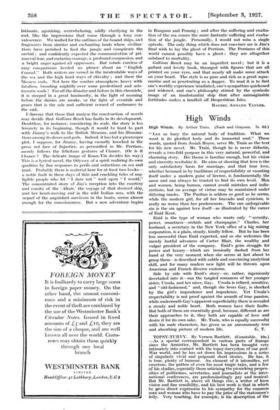High Winds
High Winds. By Arthur Train. (Nash and Grayson. 7s. 43(1.) " LET us bury the natural body of tradition. What we want is its glorified body and its immortal soul." These words, quoted from Josiah Royce, serve Mr. Train as the text for his new novel. Mr. Train, though he is never didactic, reveals a two-fold purpose in this very natural, powerful, and charming story. His theme is familiar enough, but his vision and sincerity revitalize it. He aims at showing that love is the only satisfactory -basis for marriage, and that true love, whether hemmed in by traditions of respectability or vaunting itself under a modern guise of licence, is fundamentally the same and can always be trusted to find its own level. Min and women, being human, cannot avoid mistakes and indis- cretions, but an average of virtue may be maintained under differing masks. The Puritan is seldom so good as he seems, while the modern girl, for all her bravado and cynicism, is really no worse than her predecessors. The one unforgivable sin is the sin against love itself—as illustrated by the career of Enid Kent.
Enid is the type of woman who wants only " security, power, smartness—orchids and champagne." Charles, her husband, a secretary in the New York office of a big milling corporation, is a plain, steady, kindly fellow. But he has been less successful than Enid expected, and so she welcomes the merely lustful advances of Carter Blair, the wealthy and vulgar president of the company. Enid's grim struggle for power and luxury—which are ironically dashed from her hand at the very moment when she seems at last about to grasp them—is described with subtle and convincing analytical skill, and for many readers new light will be throvin upon American and French divorce customs.
Side by side with Enid's story—or, rather, ingeniously dovetailed into it—run the tangled romances of her younger sister, Ursula, and her niece, Gay. Ursula is refined, sensitive, and "old-fashioned," and, though she loves Gay, is Xhocked by the girl's imprudence and impudence. Yet Ursula's respectability is not proof against the assault of true passion, while underneath Gay's apparent superficiality there is revealed a steady and noble heart. Both women have their faults. But both of them are essentially good, because, different as are their approaches to it, they both are capable of love and desire it for its own sake. Mr. Train, who is equally successful with his male characters, has given us an uncommonly true and absorbing picture of modern life. G. T.










































 Previous page
Previous page